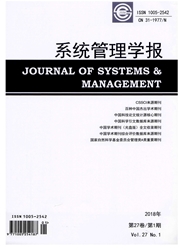

 中文摘要:
中文摘要:
修正决策者是完全自利的假设,将利他偏好纳入企业效用函数的构建,基于制造商和供应商间的Stackelberg博弈分析,考察利他偏好对双边努力行为以及供应链运作绩效的影响。研究结果表明:①企业的合作努力行为受自身的利他偏好影响,而生产努力行为受对方的利他偏好影响;②企业利他偏好的存在不仅能提高对方的效用,同时也能提高自身的效用;③相比于占主导地位的下游制造商,上游供应商的利他偏好对提高供应链整体效用的作用更大;④当制造商和供应商的利他偏好水平同时增大时,供应链整体效用能够得到最大程度的提高。
 英文摘要:
英文摘要:
We reconstruct the utility function of the supply chain node enterprises based on altruistic preference,abandoning the traditional assumption of rationally self-interest actors.We use the Stackelberg game model to investigate how the altruistic preference of the node enterprises affects the bilateral efforts and the supply chain operations.The results show that:①the opposing party's altruistic preference affects the production effort of the node enterprises, while his own altruistic preference affects collaboration effort of the node enterprises;②one of the node enterprises' altruistic preference could improve his and the other's utility;③compared to the downstream manufacturer,the upstream supplier's altruistic preference is more conducive to improve the whole supply chain's utility;④when both of the node enterprises have a higher level of altruistic preference,the whole supply chain's utility can be maximized.
 同期刊论文项目
同期刊论文项目
 同项目期刊论文
同项目期刊论文
 期刊信息
期刊信息
